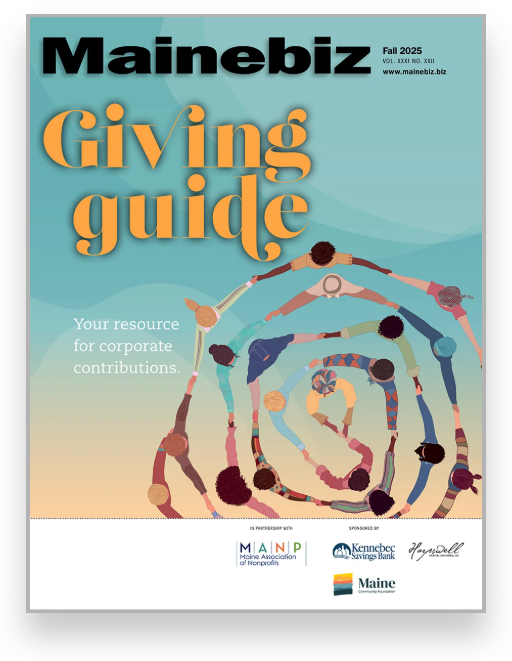Processing Your Payment
Please do not leave this page until complete. This can take a few moments.
- News
-
Editions
View Digital Editions
Biweekly Issues
- October 20, 2025
- October 6, 2025
- September 22, 2025
- September 8, 2025
- August 25, 2025
- August 11, 2025
- + More
Special Editions
- Lists
- Viewpoints
- Our Events
- Calendar
- Biz Marketplace
Lobster industry gets another reprieve in federal plan to curtail harvesting
 File photo / Laurie Schreiber
Maine’s lobster industry had another win last week when an appeals court rejected a federal plan that would have severely curtailed lobster fishing.
File photo / Laurie Schreiber
Maine’s lobster industry had another win last week when an appeals court rejected a federal plan that would have severely curtailed lobster fishing.
Last week, Maine’s lobster industry had another win when the U.S. Court of Appeals for the District of Columbia Circuit ruled that the National Marine Fisheries Service was “egregiously wrong” in how it came up with a plan designed to virtually eliminate the possibility that the endangered North Atlantic right whale could run into lobster fishing gear.
In the Maine Lobstermen's Association vs. National Marine Fisheries Service ruling, the court wrote that, given the uncertainty of any data around whether Maine lobster gear is responsible for the decline of the right whale population, the service can’t give “the ‘benefit of the doubt" to an endangered species by relying upon worst-case scenarios or pessimistic assumptions.”
The court added, “the service’s role as an expert is undermined, not furthered, when it distorts that scientific judgment by indulging in worst-case scenarios and pessimistic assumptions to benefit a favored side.”
“When the Maine Lobstermen’s Association made the decision to sue the federal government, we knew it wouldn’t be easy, but we refused to go down without a fight,” said , Patrice McCarron, the Maine Lobstermen’s Association’s policy director.
McCarron said the plan was flawed and “threatened to sink our entire fishery and devastate our livelihoods and our communities.”
She added, "We all agree with the need to ensure a safe environment in which the endangered right whale can recover, and MLA is hopeful that this decision will force the National Marine Fisheries Service to go back to the drawing board to develop a plan that uses best available science and accurate data and, importantly, that will protect whales without eliminating the lobster fishery.”
The 10-year federal plan called for reducing the risk of fishing gear and whale interaction by 90%.
The service said potential risk reduction measures could include weakened gear to allow whales to break away from entanglements; reducing the amount of fishing gear in the water column where right whales travel, either by closing fishing areas or reducing the number of buoy lines; improving identification of the source of entangling gear through increased gear marking; and/or establishing or modifying seasonal hotspot management areas
The association has argued that the goal is unachievable and impossible for the industry to survive.
In September 2021, the association filed a lawsuit challenging the 10-year whale protection plan, saying it would all but eliminate the Maine lobster fishery yet still fail to save the endangered North Atlantic right whale. The association argued that the service overestimated the lobster industry’s risk to right whales by cherry-picking the science and using unsupported assumptions and “worst-case scenarios” to justify its mandate for Maine's lobster fishery to reduce its already minimal risk to right whales.
The association also said the service failed to follow mandatory legal requirements to assess the economic and social costs of their actions.
Last September, a federal judge in Washington, D.C., ruled against the association in an opinion that deferred to the federal agency on all counts without disputing the validity of the association’s concerns. As a result, the service fast-tracked the plan to require Maine’s lobster industry to implement a 90% risk reduction as quickly as possible or the federal lobster fishery could be shutdown.
The following month, the association retained former U.S. Solicitor General Paul Clement and filed for expedited consideration of its appeal to the U.S. Court of Appeals for the District of Columbia.
Subsequently, both houses of Congress passed legislation that included a six-year-pause on the plan.
Last week’s appeals court decision orders the service to go back to the drawing board.
Plaintiff-intervenors in the appeal were the Maine Department of Marine Resources, the Maine Lobstering Union and the Massachusetts Lobstermen’s Association.
The court’s decision allows current regulations to remain in effect while the service develops a new rule and does not impact the Congressional action to delay further rulemaking until 2028.
The court also overturned an analysis, called a “biological opinion,” that the service used to determine the risk posed by the lobster and Jonah crab fisheries to right whales. And the court required the service to develop a new biological opinion.
Department of Marine Resources Commissioner Patrick Keliher said the regulations lack guaranteed conservation benefits for right whales and pose “tremendous economic harm” for fishing communities.
The court noted that the service admitted that nothing in the law required it to use a worst-case scenario in the development of models that determine the risk to right whales.
The court said lack of data led the service to conclude the lobster and Jonah crab federal fisheries kill 46 whale deaths per decade, a “staggering departure from the two documented deaths known to have originated in all U.S. fisheries over a period of nine years.
Mainebiz web partners
Related Content
Thankfully a Judge that that went by the real facts. Not the made up ones by NMF.

The Giving Guide
The Giving Guide helps nonprofits have the opportunity to showcase and differentiate their organizations so that businesses better understand how they can contribute to a nonprofit’s mission and work.
Learn More
Work for ME
Work for ME is a workforce development tool to help Maine’s employers target Maine’s emerging workforce. Work for ME highlights each industry, its impact on Maine’s economy, the jobs available to entry-level workers, the training and education needed to get a career started.
Learn More
Groundbreaking Maine
Whether you’re a developer, financer, architect, or industry enthusiast, Groundbreaking Maine is crafted to be your go-to source for valuable insights in Maine’s real estate and construction community.
Learn more-
The Giving Guide
The Giving Guide helps nonprofits have the opportunity to showcase and differentiate their organizations so that businesses better understand how they can contribute to a nonprofit’s mission and work.
-
Work for ME
Work for ME is a workforce development tool to help Maine’s employers target Maine’s emerging workforce. Work for ME highlights each industry, its impact on Maine’s economy, the jobs available to entry-level workers, the training and education needed to get a career started.
-
Groundbreaking Maine
Whether you’re a developer, financer, architect, or industry enthusiast, Groundbreaking Maine is crafted to be your go-to source for valuable insights in Maine’s real estate and construction community.
ABOUT
NEW ENGLAND BUSINESS MEDIA SITES
No articles left
Get access now
In order to use this feature, we need some information from you. You can also login or register for a free account.
By clicking submit you are agreeing to our cookie usage and Privacy Policy
Already have an account? Login
Already have an account? Login
Want to create an account? Register
Get access now
In order to use this feature, we need some information from you. You can also login or register for a free account.
By clicking submit you are agreeing to our cookie usage and Privacy Policy
Already have an account? Login
Already have an account? Login
Want to create an account? Register











1 Comments